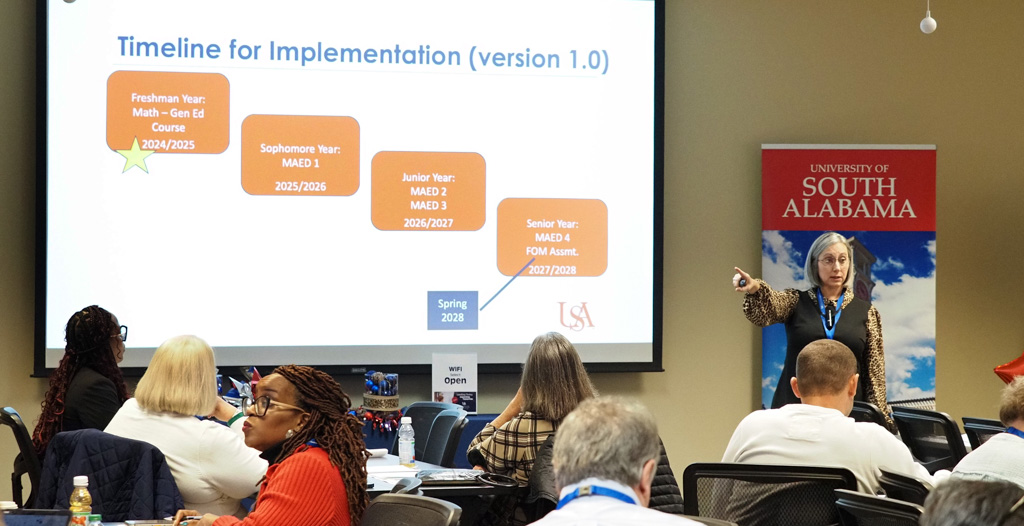USA Hosts Alabama Numeracy Act Workshop
Posted on December 11, 2024

The University of South Alabama's College of Education and Professional Studies led a statewide effort to support teachers in the implementation of the Alabama Numeracy Act of 2022.
The University brought together more than 60 deans, department chairs and professors from 35 higher education institutions, along with representatives from the Alabama State Department of Education and the Alabama Commission on Higher Education. South is on the forefront of reimagining how student-teacher candidates are taught mathematics ahead of the Act's 2026 deadline.
The collaborative workshop, held Monday, Dec. 9, focused on mathematics education in response to the Numeracy Act, a transformative law aimed at improving K-5 mathematics proficiency. The Numeracy Act’s goals include ensuring that students achieve grade-level proficiency by the end of fifth grade, placing instructional mathematics coaches in every elementary school and providing intervention programs for struggling students. To support these changes, higher education institutions must update teacher preparation programs to equip future educators with the skills and knowledge to meet the new law’s rigorous standards.
“This event was a monumental step forward for mathematics education in Alabama,” said Dr. Angela Barlow, dean of the College of Education and Professional Studies at South. “Higher education mathematics leaders from across the state collaborated to address how we prepare future teachers to meet the demands of the Alabama Numeracy Act. Our goal is to ensure teacher candidates are ready to enter classrooms equipped to make an immediate, positive impact on student learning.
Under the Numeracy Act, universities must redesign teacher preparation programs to shift essential mathematics coursework from general education requirements to junior- and senior-level teacher education courses. These changes, which take effect in fall 2026, aim to ensure that future educators receive more specialized training in mathematics instruction.
“Rather than waiting for the deadline, we’ve already started reworking our curriculum at the University of South Alabama," Barlow said. "This event allowed us to share ideas and resources with our colleagues across the state so that all of Alabama’s teacher preparation programs are moving forward together."
The day was filled with breakout sessions and strategy discussions centered on curriculum alignment, new course development and best practices for supporting future teachers. Attendees worked together to exchange ideas, discuss challenges, identify solutions collectively and develop strategies to strengthen the educator pipeline.
“The level of collaboration we saw at this event was remarkable,” said Dr. Karen Anderson, director of the Office of Mathematics Improvement at the Alabama State Department of Education. “This wasn’t just about one university — it was about building a unified approach to preparing teachers who will raise math proficiency for elementary students in Alabama.”
This proactive and collaborative approach will ensure teacher candidates are prepared to assess student progress and provide targeted support for elementary students struggling with mathematics concepts.
“This isn’t a one-time conversation,” Barlow said. “This is the beginning of a long-term partnership that will continue to grow as we implement changes to our programs. Our shared goal is to produce educators who are ready to lead in their classrooms and empower Alabama’s next generation of learners.”





